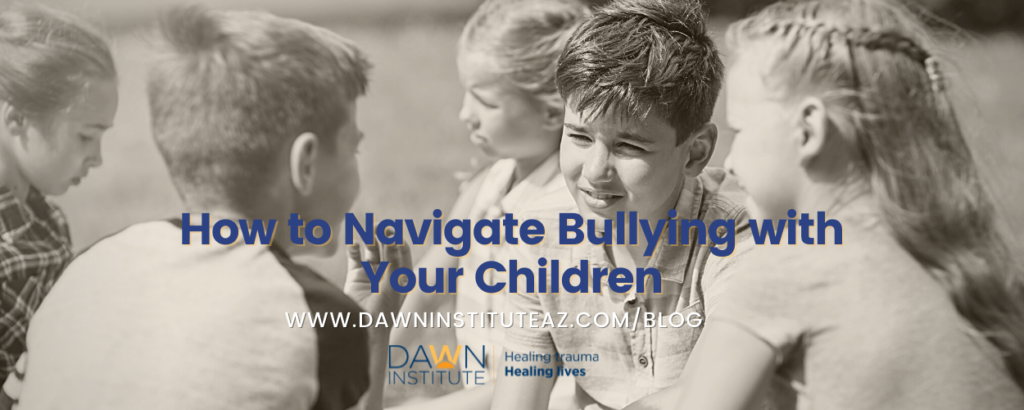Navigating bullying starts as early as pre-school and early elementary school. Kiddos and teens have to consistently deal with bullying not just in-person but through social media. So how do we parents help our children navigate through this dilemma, especially when bullying starts so young? How do we even know bullying is happening when our children probably don’t understand the concept yet?
There are four key things parents can do to prevent and navigate the reality of bullying:
- Talk to your children
- Listen for red flags
- Exemplify self-care
- Know the lesson you want them to learn
Next, we’ll break these down below.
1. Talk to Your Children
When you read “talk to your children,” it may sound super obvious, but something this simple can really make such a huge difference. You can ask them how their day was, about their friends, what games they play or their hobbies. Practicing this line of questioning will give your children an opportunity to tell you about how their friends talk to them and treat them. This will also give you the opportunity to teach values for healthy friendships and relationships. Talking with your children goes hand in hand with good listening.
2. Listen for Red Flags
I have heard so many teens tell me how their friends were calling them names, hitting them, or taking or throwing their belongings. And these teens thought this behavior was normal and healthy! Even after stating multiple times they did not like it or wanted it to stop, their friends continued the behavior. Next, I have heard parents respond to their teens with “kids will be kids” or simply tell them to not let it bother them. But getting past this behavior is not that simple.
In 2018, IKEA sponsored a project with plants to show children in schools how bullying effects living things. I like to share that video with parents to explain the effects that positive and negative language have on our biology. To a kid or teen, this “normal” behavior is a huge stressor, whether or not they “turn a blind eye.” Your children need you to recognize negative behavior when they can’t so that you can assure them it’s okay to be sad and hurt and support them in the aftermath.
3. Exemplify Self-Care
Giving children constant words of affirmation is so important, but speaking with affirmation about yourself may be even more important! Exemplifying self-care goes so much further than simply preaching it. By taking care of yourself with your words and actions, you are showing them how to take care of themselves. Monkey see, monkey do.
Don’t say the negative thoughts you may think or feel out loud if your children are even remotely close to you. They hear those negative comments and often look in the mirror and think them about themselves, because they look up to you. This can be really hard if you struggle with mental health or body image issues, but it’s key in teaching them a healthy view of self.
4. Know the Lesson You Want Them to Learn
The hard truth is that you can’t protect your kids from experiencing bullying, but you can choose the lesson you want them to learn from it. Is it to stand up for themselves or to avoid? Is it that you will step in and take care of it? Or is it to use their resources?
Next, consider what tools they need to learn this lesson. Resolving the situation for them or coaching them through it will teach different lessons. A lot of parents want shield their children by trying to fix the problem or telling the teacher or principle themselves. Consider whether your actions prevent your child from learning a valuable lesson about how to manage situations themselves.
Additional Resources
Hopefully these four actions will help you and your child navigate the difficult experience of bullying. You can also check out the bullying resources linked below for parents, teens, and kiddos. For additional support, Dawn Institute offers therapy to children and families to treat and prevent trauma. Reach out today if you or your child could use extra support and resources.

